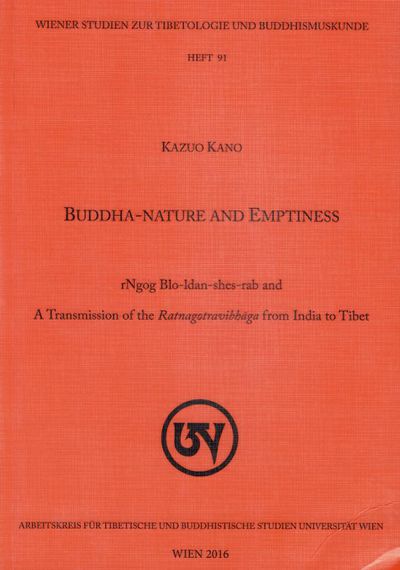No edit summary |
No edit summary |
||
| Line 11: | Line 11: | ||
}} | }} | ||
|FullTextRead=No | |FullTextRead=No | ||
|BookToc=*PREFACE | |BookToc=* {{i|PREFACE|i}} | ||
*Introduction i | * {{i|Introduction|i}} | ||
*PART I Historical and Doctrinal Background 5 | * {{i|PART I Historical and Doctrinal Background|5}} | ||
**Chapter 1: The Authorship of the Ratnagotravibhāga and Its Transmission in India from the 5th to the 10th Century 17 | ** {{i|Chapter 1: The Authorship of the Ratnagotravibhāga and Its Transmission in India from the 5th to the 10th Century|17}} | ||
**Chapter 2: The Resurrection of the Ratnagotravibhāga in India in the Early 11th Century: Maitripa and Jñānasrimitra 43 | ** {{i|Chapter 2: The Resurrection of the Ratnagotravibhāga in India in the Early 11th Century: Maitripa and Jñānasrimitra |43}} | ||
**Chapter 3: Ratnakarasanti’s Understanding of Buddha-nature 71 | ** {{i|Chapter 3: Ratnakarasanti’s Understanding of Buddha-nature |71}} | ||
**Chapter 4: The Transmission ofthe Ratnagotravibhāga in East India from the 11th to the 13th Century: From Prajñākaramati to Vibhūticandra 97 | ** {{i|Chapter 4: The Transmission ofthe Ratnagotravibhāga in East India from the 11th to the 13th Century: From Prajñākaramati to Vibhūticandra |97}} | ||
**Chapter 5: The Kashmiri Tradition of the Ratnagotravibhāga Exegesis in the 11th and 12th Centuries: Sajjana and his Circle 135 | ** {{i|Chapter 5: The Kashmiri Tradition of the Ratnagotravibhāga Exegesis in the 11th and 12th Centuries: Sajjana and his Circle |135}} | ||
**Chapter 6: Six Tibetan Translations of the Ratnagotravibhāga 155 | ** {{i|Chapter 6: Six Tibetan Translations of the Ratnagotravibhāga |155 }} | ||
**Conclusion 181 | ** {{i|Conclusion |181}} | ||
*PART II rNgog Blo-ldan-shes-rab and His Doctrinal Position 189 | * {{i|PART II rNgog Blo-ldan-shes-rab and His Doctrinal Position |189}} | ||
**Chapter 7 The Life and Works of rNgog Blo-ldan-shes-rab 191 | ** {{i|Chapter 7 The Life and Works of rNgog Blo-ldan-shes-rab |191}} | ||
**Chapter 8 rNgog’s Doctrinal Positions in Relation to Sajjana’s and His Commentarial Style 211 | ** {{i|Chapter 8 rNgog’s Doctrinal Positions in Relation to Sajjana’s and His Commentarial Style |211}} | ||
**Chapter 9 rNgog’s rGyud bla ma'i don bsdus pa as a Reflection of His Own Doctrinal Position 241 | ** {{i|Chapter 9 rNgog’s rGyud bla ma'i don bsdus pa as a Reflection of His Own Doctrinal Position |241}} | ||
**Conclusion 277 | ** {{i|Conclusion |277}} | ||
*PART III rNgog’s Impact on Later Developments 283 | * {{i|PART III rNgog’s Impact on Later Developments |283}} | ||
**Chapter 10 rNgog’s Impact on Doctrinal Developments from the 11th to the Early 14th Century 285 | ** {{i|Chapter 10 rNgog’s Impact on Doctrinal Developments from the 11th to the Early 14th Century |285}} | ||
**Chapter 11 rNgog’s Impact on Doctrinal Developments from the Late 14th to the 16th Century 345 | ** {{i|Chapter 11 rNgog’s Impact on Doctrinal Developments from the Late 14th to the 16th Century |345}} | ||
**Conclusion 379 | ** {{i|Conclusion |379}} | ||
*FINAL CONSIDERATIONS 383 | * {{i|FINAL CONSIDERATIONS |383}} | ||
**Resituating rNgog’s Position in a Wider Context 385 | ** {{i|Resituating rNgog’s Position in a Wider Context |385}} | ||
*APPENDICES 393 | * {{i|APPENDICES |393}} | ||
**Appendix A: A Topical Outline of the rGyud bla ma'i don bsdus pa 395 | ** {{i|Appendix A: A Topical Outline of the rGyud bla ma'i don bsdus pa |395}} | ||
**Appendix B: A List of Commentaries of the Ratnagotravibhāga 405 | ** {{i|Appendix B: A List of Commentaries of the Ratnagotravibhāga |405}} | ||
*ABBREVIATIONS AND BIBLIOGRAPHIES 415 | * {{i|ABBREVIATIONS AND BIBLIOGRAPHIES |415}} | ||
*INDICES 461 | * {{i|INDICES |461}} | ||
|AddRelatedTab=Yes | |AddRelatedTab=Yes | ||
|AddQuotesTab=Yes | |AddQuotesTab=Yes | ||
}} | }} | ||
Revision as of 14:41, 19 July 2018
An essential study of a key text that presents buddha-nature theory and its transmission from India to Tibet, this book is the most thorough history of buddha-nature thought in Tibet and is exceptional in its level of detail and scholarly apparatus. It serves as a scholarly encyclopedia of sorts with extensive appendices listing every existent commentary on the Ratnagotravibhāga (Uttaratantraśāstra), as well as covering Ngok Lotsawa's commentarial text and his philosophical positions related with other Tibetan thinkers.
| Citation | Kano, Kazuo. Buddha-Nature and Emptiness: rNgog Blo-ldan-shes-rab and A Transmission of the Ratnagotravibhāga from India to Tibet. Wiener Studien zur Tibetologie und Buddhismuskunde 91. Vienna: Arbeitskreis für Tibetische und Buddhistische Studien Universität Wien, 2016. |
|---|---|


